Module 10 知识辅导
Module10单词讲解(教学设计+素材))-2024-2025学年外研版(三起)英语五年级上册

展示一些关于海底生物的图片或视频片段,让学生初步感受海洋生物的魅力。
简短介绍Module 10的主要内容,为接下来的学习打下基础。
2. 单词基础知识讲解(10分钟)
目标: 让学生了解Module 10中的单词的基本概念和用法。
过程:
- camera:相机,是一种用于拍摄照片或视频的设备,潜水员常用防水相机记录水下世界。
2. 潜水员装备:
- diver:潜水员,是指在水下进行潜水活动的人,需要穿戴潜水装备。
- camera:相机,是一种用于拍摄照片或视频的设备,潜水员常用防水相机记录水下世界。
3. 海洋环境:
- sand:沙子,是海滩的主要组成部分,海浪冲刷形成。
A. octopus
B. fish
C. shell
D. sea
E. wave
答案:B. fish
解析:本题考查学生对单词搭配的掌握。根据句意,应选用表示海洋生物的单词,结合句子结构,应使用名词作宾语,故选 fish。
例题4:
将下列单词按音序排列:
A. sand
B. cold
C. deep
D. bright
2. 网络教学平台:利用网络教学平台,发布预习资料、课堂任务和拓展阅读,方便学生自主学习和交流。
3. 互动式白板:运用互动式白板,进行单词拼写、句子构建等教学活动,提高学生的参与度和积极性。
五、教学过程设计
1. 导入新课(5分钟)
目标: 引起学生对Module 10单词讲解的兴趣,激发其探索欲望。
过程:
E. round
答案:B. cold
D. deep
Module10__知识点总结
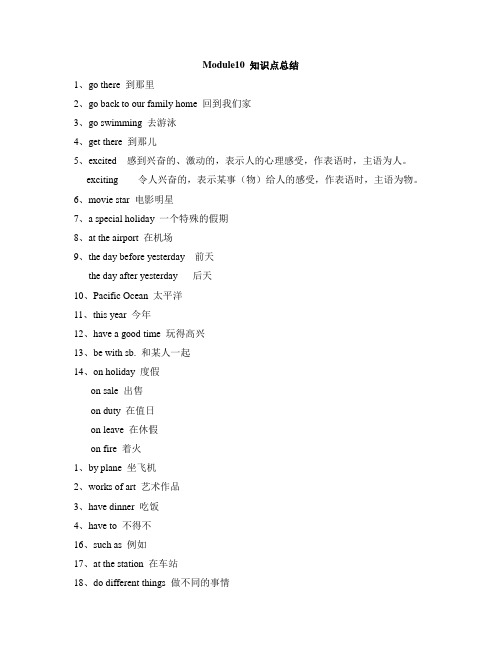
Module10 知识点总结1、go there 到那里2、go back to our family home 回到我们家3、go swimming 去游泳4、get there 到那儿5、excited 感到兴奋的、激动的,表示人的心理感受,作表语时,主语为人。
exciting 令人兴奋的,表示某事(物)给人的感受,作表语时,主语为物。
6、movie star 电影明星7、a special holiday 一个特殊的假期8、at the airport 在机场9、the day before yesterday 前天the day after yesterday 后天10、Pacific Ocean 太平洋11、this year 今年12、have a good time 玩得高兴13、be with sb. 和某人一起14、on holiday 度假on sale 出售on duty 在值日on leave 在休假on fire 着火1、by plane 坐飞机2、works of art 艺术作品3、have dinner 吃饭4、have to 不得不16、such as 例如17、at the station 在车站18、do different things 做不同的事情19、spend all day 花整天时间spend 与takespend 主语必须是人,常用于spend tine / money on sth.“ 在…上花费时间/金钱”,或spend time/money (in) doing sth.“花费时间/金钱做某事”。
take 常用句型为:It takes sb.+时间+to do sth.表示“做某事花了某人多少时间”。
20、take lots of photos 照许多照片21、go with sb. 与某人一起去22、take a walk 散步23、street market 街头市场24、do shopping 购物25、all day 整天26、wait in line排队等候cut in line 插队27、at the top of 在…顶端28、how long 表示“多久,多长时间”,用来提问时间的长短,常用“for+一段时间”或“since+时间点/一段时间+ago”或“si nce+从句”作答。
Module 10课文知识点总结(含语法)-外研版八年级下册英语
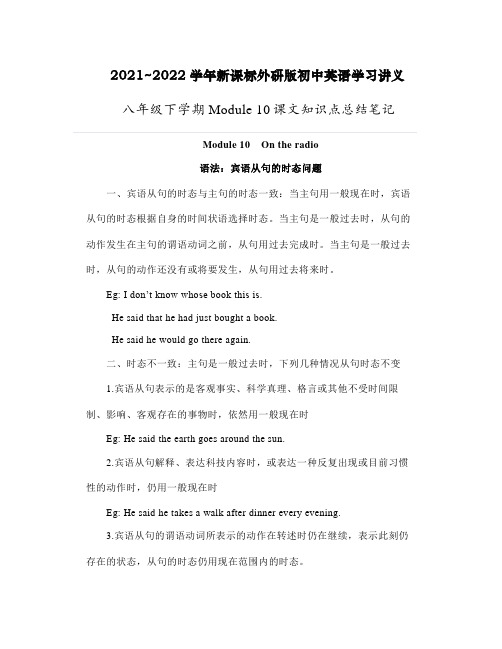
2021~2022学年新课标外研版初中英语学习讲义八年级下学期Module 10课文知识点总结笔记Module 10 On the radio语法:宾语从句的时态问题一、宾语从句的时态与主句的时态一致:当主句用一般现在时,宾语从句的时态根据自身的时间状语选择时态。
当主句是一般过去时,从句的动作发生在主句的谓语动词之前,从句用过去完成时。
当主句是一般过去时,从句的动作还没有或将要发生,从句用过去将来时。
Eg: I don’t know whose book this is.He said that he had just bought a book.He said he would go there again.二、时态不一致:主句是一般过去时,下列几种情况从句时态不变1.宾语从句表示的是客观事实、科学真理、格言或其他不受时间限制、影响、客观存在的事物时,依然用一般现在时Eg: He said the earth goes around the sun.2.宾语从句解释、表达科技内容时,或表达一种反复出现或目前习惯性的动作时,仍用一般现在时Eg: He said he takes a walk after dinner every evening.3.宾语从句的谓语动词所表示的动作在转述时仍在继续,表示此刻仍存在的状态,从句的时态仍用现在范围内的时态。
Eg: She told me the other day that she is only eight.4.从句中有具体的时间状语,动作是发生在主句动作之前,仍用一般过去时,不改为过去完成时Eg: He said that he was born in 1998.1.Thank you for… = Thanks for + 名词、代词、动词ing因…而感谢2.show… around = take… around= take… to visit带…参观Eg: Can you show/ take us around your factory?= Can you take us to visit your factory?e this way 这边请4.be on (灯等)亮;(电影等)上映5.mean to do sth. 想或企图做某事mean doing sth. 意味着做某事mean (v.)--- meaning (n.) 意思Eg: I had meant to visit you, but I was too busy.My new job will mean travelling all over the world.6.on air 正在广播Eg: We will be on air in ten minutes.7.avoid doing sth. 避免做某事avoid 后接名词、代词或动名词Eg: You should avoid making the same mistakes.avoid (v.) 回避;避开Eg: Everyone seemed to be avoiding him.avoid(v.) 逃避Eg: You should avoid over-spending.8.make some noise 制造噪音9.the latest national and international news 最新的国内、国际新闻10.get crazy 令人发狂be crazy about…热衷于;迷恋于like crazy 发狂似的;极度地go crazy变得疯狂drive sb. crazy 让某人疯狂11.keep doing sth. 不断做某事12.do interview with sb.= interview sb. 采访某人interview --- interviewer 采访者/ interviewee被采访者13.keep quiet 保持安静14.if (1) “如果”引导条件状语从句,如果放在主句前,从句要用逗号与主句隔开Eg: I won’t go by plane if it rains tomorrow.If you want to go, please tell me.(2)if所引导的条件句,要遵循“主将从现”原则Eg: If it doesn’t rain tomorrow, we’ll go to the Great Wall.(3) if引导的条件句,当条件成立必然有某种结果时,主句和从句用一般现在时Eg: If you drop a glass, it breaks.(4)if “是否”时,不用主将从现Eg: I don’t know if it will rain tomorrow.15.against (prep.) “以…为竞争对手;与…对抗”后接名词、代词、动词ingEg: Yesterday we played against a very strong team and we won.反对;对抗Eg: My father is against my plan.16.t he end of……的尾声at the end of…在…末端by the end of…直到…为止in the end 最后;最终1.look down at…低下头看look down upon 瞧不起2.Shouldn’t you be at school?你不用上学吗?这是一个否定疑问句,用于表示惊奇。
六年级上册Module 10知识梳理
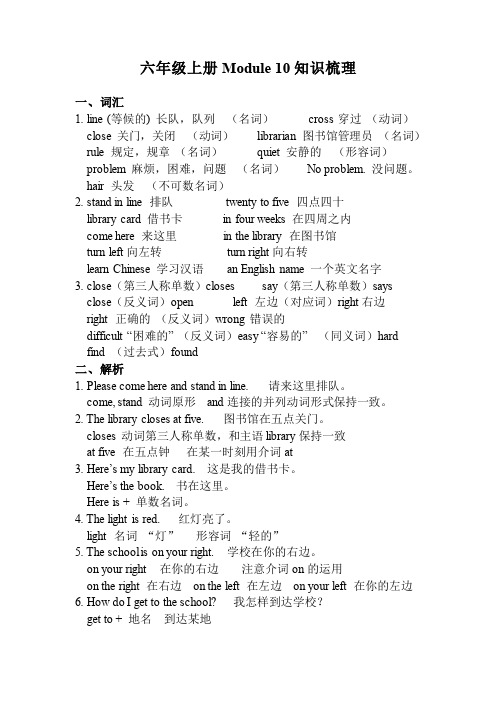
六年级上册Module 10知识梳理一、词汇1. line (等候的) 长队,队列(名词)cross 穿过(动词)close 关门,关闭(动词)librarian 图书馆管理员(名词)rule 规定,规章(名词)quiet 安静的(形容词)problem 麻烦,困难,问题(名词)No problem. 没问题。
hair 头发(不可数名词)2. stand in line 排队twenty to five 四点四十library card 借书卡in four weeks 在四周之内come here 来这里in the library 在图书馆turn left向左转turn right向右转learn Chinese 学习汉语an English name 一个英文名字3. close(第三人称单数)closes say(第三人称单数)says close(反义词)open left 左边(对应词)right右边right 正确的(反义词)wrong 错误的difficult “困难的”(反义词)easy “容易的” (同义词)hard find (过去式)found二、解析1. Please come here and stand in line. 请来这里排队。
come, stand 动词原形and连接的并列动词形式保持一致。
2. The library closes at five. 图书馆在五点关门。
closes 动词第三人称单数,和主语library保持一致at five 在五点钟在某一时刻用介词at3. Here’s my library card. 这是我的借书卡。
Here’s the book. 书在这里。
Here is + 单数名词。
4. The light is red. 红灯亮了。
light 名词“灯”形容词“轻的”5. The school is on your right. 学校在你的右边。
Module10知识
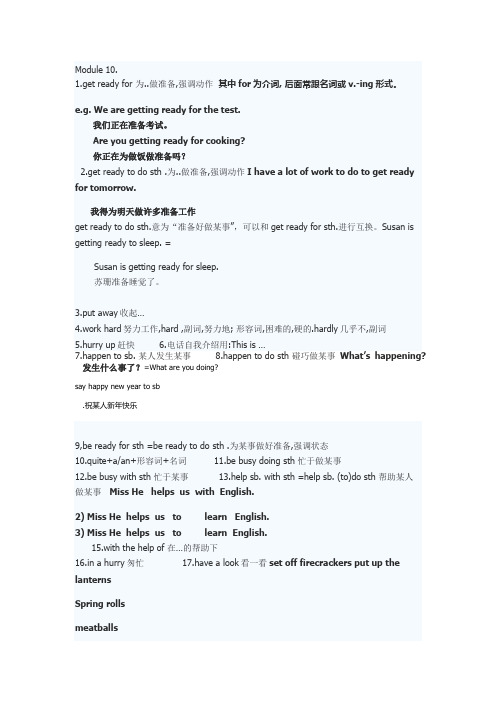
Module 10.1.get ready for 为..做准备,强调动作其中for为介词, 后面常跟名词或v.-ing形式。
e.g. We are getting ready for the test.我们正在准备考试。
Are you getting ready for cooking?你正在为做饭做准备吗?2.get ready to do sth .为..做准备,强调动作I have a lot of work to do to get ready for tomorrow.我得为明天做许多准备工作get ready to do sth.意为“准备好做某事”,可以和get ready for sth.进行互换。
Susan is getting ready to sleep. =Susan is getting ready for sleep.苏珊准备睡觉了。
3.put away收起…4.work hard努力工作,hard ,副词,努力地; 形容词,困难的,硬的.hardly几乎不,副词5.hurry up赶快6.电话自我介绍用:This is …7.happen to sb. 某人发生某事 8.happen to do sth 碰巧做某事What’s happening?发生什么事了?=What are you doing?say happy new year to sb.祝某人新年快乐9,be ready for sth =be ready to do sth .为某事做好准备,强调状态10.quite+a/an+形容词+名词 11.be busy doing sth 忙于做某事12.be busy with sth 忙于某事 13.help sb. with sth =help sb. (to)do sth 帮助某人做某事Miss He helps us with English.2) Miss He helps us to learn English.3) Miss He helps us to learn English.15.with the help of 在…的帮助下16.in a hurry匆忙 17.have a look看一看set off firecrackers put up the lanternsSpring rollsmeatballsChinese couplets1.18.sweep away扫去如果宾语为名词,可放在away之前或之后;如果宾语为代词,只能放在sweep与away之间。
Module10(讲义)英语六年级上册
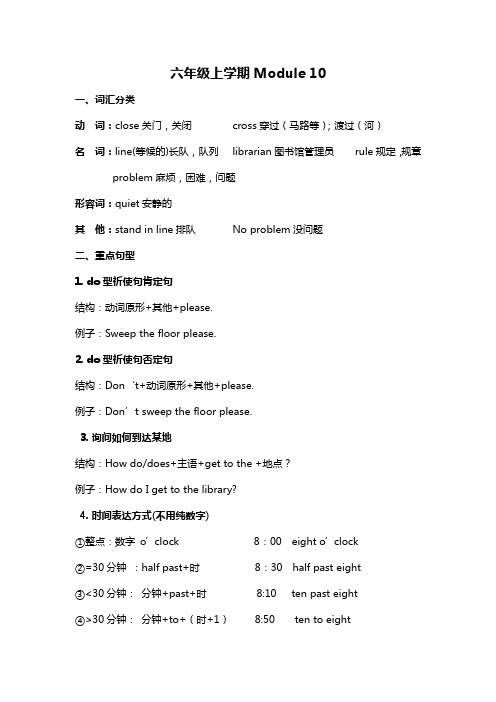
六年级上学期Module 10一、词汇分类动词:close关门,关闭cross穿过(马路等);渡过(河)名词:line(等候的)长队,队列librarian图书馆管理员rule规定,规章problem麻烦,困难,问题形容词:quiet安静的其他:stand in line排队No problem没问题二、重点句型1. do型祈使句肯定句结构:动词原形+其他+please.例子:Sweep the floor please.2. do型祈使句否定句结构:Don‘t+动词原形+其他+please.例子:Don’t sweep the floor please.3.询问如何到达某地结构:How do/does+主语+get to the +地点?例子:How do I get to the library?4.时间表达方式(不用纯数字)①整点:数字o’clock 8:00 eight o’clock②=30分钟:half past+时8:30 half past eight③<30分钟:分钟+past+时8:10 ten past eight④>30分钟:分钟+to+(时+1)8:50 ten to eight⑤15分钟:a quarter 8:15 a quarter past eight➢牛刀小试一、英汉互译。
1. 关门,关闭__________________2. 穿过,渡过_____________3. line ___________________________4. librarian ________________5. 麻烦,困难,问题____________6. quiet ____________________7. 9:45 __________________ 8. 10:20__________________二、单项选择。
( ) 1. __________ at home, please.A. StayedB. StaysC. Stay( ) 2. __________ smoke here.A. NotB. Don’tC. No( ) 3. Clean the __________ , please.A. roomB. waterC. money三、句子翻译。
Module10模块知识梳理(知识清单)英语五年级下册

【例句】Who is going to Disneyland with you next week?
My mother.
6.如何“说”
speak
说/讲某种语言
say
强调说话内容:say to sb. 对某人说
tell
“告诉”,tell sb. sth. /tell sth. to sb. 告诉某人某事
9.表达“……过去为……做了……“
【句式结构】主语+made+某物+for+某人.
【例句】Imade a cake for myEnglishteacher yesterday.
【例句】When are you going to t.
5.询问谁将要/打算和你一起去某地
【句式结构】Who +be动词+主语going (to)+地点+with you?
【知识复习】with的用法:(1)与……一起;同/跟/和 (2)具有,带有
talk
“交谈“,talk to/with sb. (about) sth. 同某人谈论(某事)
【例句】He speakEnglishat the meeting.
Itold him my name yesterday.
The teacher is talking to her friend.
What did you say to him?
1.表示“将要/打算”的be going to
【句式结构】主语+be going to+动词原形(+其他)?
be going to+地点名词
将要/打算去某地
外研六上 Module 10 知识清单
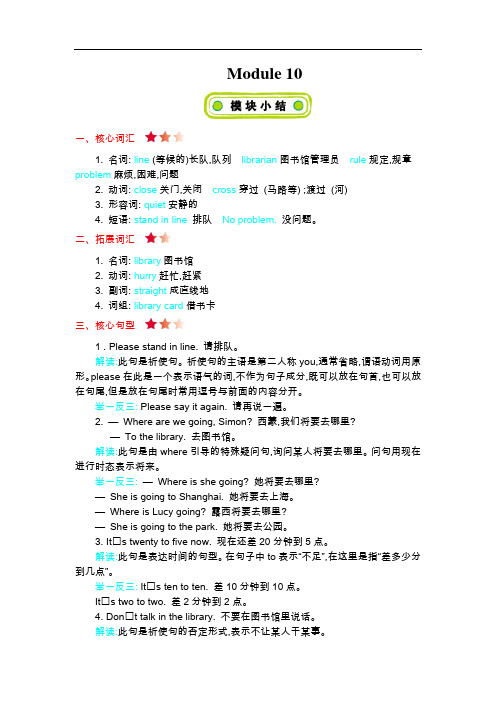
Module 10一、核心词汇1. 名词: line (等候的)长队,队列librarian图书馆管理员rule规定,规章problem麻烦,困难,问题2. 动词: close关门,关闭cross穿过(马路等) ;渡过(河)3. 形容词: quiet安静的4. 短语: stand in line 排队No problem. 没问题。
二、拓展词汇1. 名词: library图书馆2. 动词: hurry赶忙,赶紧3. 副词: straight成直线地4. 词组: library card借书卡三、核心句型1 . Please stand in line. 请排队。
解读:此句是祈使句。
祈使句的主语是第二人称you,通常省略,谓语动词用原形。
please在此是一个表示语气的词,不作为句子成分,既可以放在句首,也可以放在句尾,但是放在句尾时常用逗号与前面的内容分开。
举一反三: Please say it again. 请再说一遍。
2. —Where are we going, Simon? 西蒙,我们将要去哪里?—To the library. 去图书馆。
解读:此句是由where引导的特殊疑问句,询问某人将要去哪里。
问句用现在进行时态表示将来。
举一反三:—Where is she going? 她将要去哪里?—She is going to Shanghai. 她将要去上海。
—Where is Lucy going? 露西将要去哪里?—She is going to the park. 她将要去公园。
3. It s twenty to five now. 现在还差20分钟到5点。
解读:此句是表达时间的句型。
在句子中to表示“不足”,在这里是指“差多少分到几点”。
举一反三: It s ten to ten. 差10分钟到10点。
It s two to two. 差2分钟到2点。
4. Don t talk in the library. 不要在图书馆里说话。
- 1、下载文档前请自行甄别文档内容的完整性,平台不提供额外的编辑、内容补充、找答案等附加服务。
- 2、"仅部分预览"的文档,不可在线预览部分如存在完整性等问题,可反馈申请退款(可完整预览的文档不适用该条件!)。
- 3、如文档侵犯您的权益,请联系客服反馈,我们会尽快为您处理(人工客服工作时间:9:00-18:30)。
Module 10 知识讲解
I.重难点解析:
1. -I’d like to go with yo u!
-So would I ! (Unit 1, P80)
解析: (1) I’d like to= I wo uld like to, 其中“wo uld+ v.”可以用来表示想象推测或可能, 如:
It wo uld be lo vely to go to New York.
(2). “So +助动词+主语”这个结构表示“……也……”的意思,即上面所说的事也适用于另一个人或物。
如:
-Kate enjoys listening to music.
-So does To m!
-Kate can sing and dance.
-So can To m!
(3)、“So+主语+助动词”表示“……是这样的,……那样/这样做了……”的意思,对上面所说的事加以肯定。
如:
-I can”t find my pen. Have you seen it anywhere?我找不到我的钢笔了,你有没有在什么地方看到过它?
-Is it in your desk? 它是不是在你的书桌里?
-Ah, so it is. 啊,是在这儿。
2. I’d be afraid that something would go wrong with the plane.(Unit 1, P80)
解析: go wrong 表示“ 出毛病,出故障” 。
如:
He found it was very easy to go wrong when he was young and inexperienced.
3. Don’t be silly! (Unit 1, P80)
解析: silly 在这里的意思是“傻的,可笑的” 。
如:
Don’t be so silly---- you’re acting like a child!
4. Stay in touch! (Unit 1, P80)
Stay/ Keep in touch!表示“ 保持联系”;lose touch表示“失去联系”。
如:
Linda has lost touch with most of her friends from primary school.
5. Would it b e a perfect ho liday fo r yo u? (Unit 2, P82)
解析: for有很多种用法:
A. 表示“当作、作为”。
如:
I like some bread and milk for breakfast. 我喜欢把面包和牛奶作为早餐。
What will we have for supper? 我们晚餐吃什么?
B. 表示理由或原因,意为“因为、由于”。
如:
Thank you for helping me with my English. 谢谢你帮我学习英语。
C. 表示动作的对象或接受者,意为“给……”、“对…… (而言)”。
如:
Let me pick it up for you. 让我为你捡起来。
Watching TV too much is bad for your health. 看电视太多有害于你的健康。
D. 表示时间、距离,意为“计、达”。
如:
I usually do the running for an hour in the morning. 我早晨通常跑步一小时。
We will stay there for two days. 我们将在那里逗留两天。
E. 表示去向、目的,意为“向、往、取、买”等。
如:
Let’s go for a walk. 我们出去散步吧。
I came here for my schoolbag.我来这儿取书包。
F. 表示所属关系或用途,意为“为、适于……的”。
如:
It’s time for school. 到上学的时间了。
Here is a letter for you. 这儿有你的一封信。
G. 表示“支持、赞成”。
如:
Are you for this plan or against it? 你是支持还是反对这个计划?
H. 用于一些固定搭配中。
如:
Who are you waiting for? 你在等谁?
For example, Mr Green is a kind teacher. 比如,格林先生是一位心地善良的老师。
6. Would life be as easy as when yo ur parents are aro und? (Unit 2, P82)
解析: aro und 在本句中表示: here , or near this p lace, 如:
--Is Tome aro und?
-- No, he has left.
7. I can fill an empty stomach with tomato and egg soup, but that’s all.(Unit 2, P82) 解析:(1). fill… with意为“把……装满……”,表动作。
如:
Please fill the glass with water. 请把杯子装满水。
a basket full of apples
(2) .be full of意为“……里装满了……”,表状态。
如:
The basket is full of apples.
8. …the 13-year-old boy said…(Unit 2, P82)
解析:the 13-year-old在本句中作定语, 修饰boy, 名词或这种带连字符的名词短语在句子中做定语时, 常用单数相似, 如本句中的year, 如:
I have read a 120- page book.
II.语法:wo uld与状语从句(3)
1.wo uld表示“想象” 用法:
我们可以用would表示“想象”,想象自己未来可能会做什么, 如:
I wo uld have 2 wings and then fly to the moo n.
I wo uld p ick much mo ney o n my way ho me.
2. 结果状语从句由连词( s o )that, so…that, such…that引导。
(1).so…that 如此…以至于
The scientist’s repo rt was so instructive that we were all very excited.
科学家的报告很有启发性,我们感到很兴奋。
He always stud ied so hard that he made great pro gress.
他总是那么努力,结果他取得了很大的进步。
(2). such…that 如此…以至
It’s such nice weather that all o f us want to go to the park.
天气是如此的好,我们大家都想去公园玩。
The weather is so nice that I’d like to take a walk.
天气是如此只好,以至于我想去散散步.
注意:so +adj./ad v.+ that,such +n.+ that 以上两种句型都表示结果,其中so为副词,后接形容词,副词原型,当可数名词前有many, few;不可数名词前有much, little修饰时,应采用句型:so many (few, much,
little )+n. 。
such为形容词, 后只能接名词。
这名词既可以地可数的,也可以是不可数的。
如果这名词是可数,单数,则必须在名词前敬爱冠词a(an). 常见的形式是:such a (beautiful)garden, such(nice)peop le.
Mike is so ho nest a man that we all believe him.
麦克是如此诚实的一个人,以至于大家都相信他
It is such nice weather that I’d like to take a walk.
天气是如此只好,以至于我想去散散步.
I’ve had so many falls that I’m b lack and b lue all o ver.
我跌了很多跤,浑身数摔得清一块紫一块.
There are so few no tebooks th at I can’t give yo u any.
笔记本太少了,我一本也给不了你.
3. 让步状语从句
让步状语从句由though, although引导, 相当于汉语的“ 尽管…, 但是…”
Although it's raining, they are still working in the field.
虽然在下雨,但他们仍在地里干活。
注意:当有though, although时,后面的从句不能有but,用了but就不用though,如:
He is very old, but he still works very hard.虽然他很老,但仍然努力地工作。
